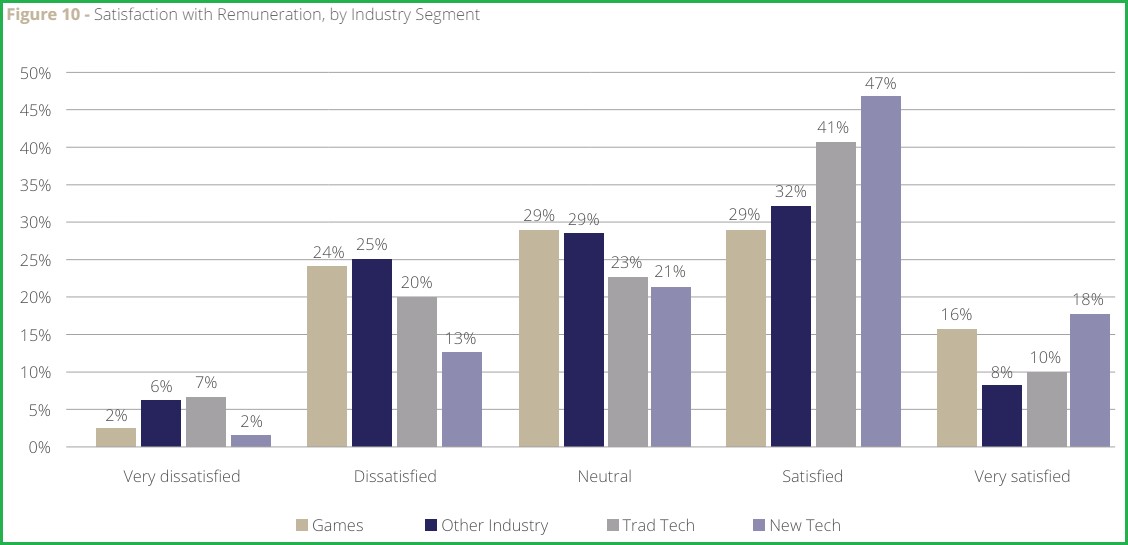Tech and IT professionals working in gaming or government sectors are receiving lower base salaries and pay rises than those in traditional and new tech companies, according to union Professionals Australia.
The research also found women in tech were still at a significant disadvantage compared to their male counterparts, as they faced a gender pay gap and a greater likelihood of experiencing discrimination or harassment at work.
The report, released on Tuesday, stemmed from 1,463 survey responses sent in by members of Australia's tech industry in mid-2023.
It found professionals working in the game design and development sector had median base salaries 43 per cent lower than those working at big ‘new tech’ employers such as Atlassian, Canva, Xero and Google.
Entry level roles in the games industry were found to receive compensation of around $63,000 per year, whereas traditional and new tech companies were paying just over $100,000 for their graduate roles.
The survey found tech and IT professionals in the private sector received 5.8 per cent in annual salary growth last year and those in the games sector saw 5.7 per cent growth, but those in the public sector saw only 2 per cent rises.
This did not keep up with the Consumer Price Index (a popular measure of inflation), which reached 7 per cent in the 12 months to the March 2023 quarter.
Workers in traditional and new tech companies also received greater non-cash benefits than gaming and public sector workers, while employees in new tech had more access to stock-based compensation.
Professionals Australia’s interim CEO Paul Inglis said the report showed the country’s tech sector was a “two-speed economy”.
“The perception of the tech and IT sector is often of innovation, dynamism, growth and high salaries,” he said.
“But the reality for the tech and IT workers on the ground can vary depending on where you work and your gender.”

Workers in new and traditional tech companies were the most likely to be satisifed with their remuneration. Image: 2024 Professionals Australia 'Employment and remuneration trends for tech, software and IT professionals' report
Women in tech still face disadvantage
Professionals Australia’s report found women in tech and IT faced low representation — particularly pronounced in senior management — and less than a quarter of its respondents identified as female.
Women also reported an average gender pay gap of 8 per cent, but the gap was larger for women in gaming.
The survey found a 14 per cent gender pay gap in the games industry, 13.4 per cent in new tech companies, 8.8 per cent in traditional tech, and 7.7 per cent in other industries including the public sector.
Companies in Australia with 100 or more employees must report their wage gap data to the Workplace Gender Equality Agency (WGEA).
Data released by the agency in February showed an overall median gender pay gap for salary of 14.5 per cent for men and women in the same company, which increased to 19 per cent for their overall remuneration.
Australia’s tech industry reported an above-average gender pay gap, with one company seeing a gap of 35 per cent for salaries and more than 52 per cent for remuneration between men and women.
Professionals Australia’s survey also found women were more likely to experience harassment and discrimination at work than their male coworkers, which was often a reason they considered leaving the profession.
Inglis said “businesses must do more to attract, retain, and support women into senior leadership roles”.
He claimed the research highlighted a need for collective bargaining to increase salaries — particularly for game workers, public sector employees and women — while also helping to prevent gender discrimination.
More insecurity for 'new tech’ workers
The report found those working in new tech companies experienced the greatest levels of job insecurity, with 71 per cent saying redundancies had occurred in their workplace in the last 24 months.
Overall, more than 60 per cent of respondents in the private sector had seen their employer make workers redundant in the past two years — most commonly within internet service providers, web search companies and data processing firms.
While workers in the public sector reported greater job security and fewer working hours, they also reported higher rates of bullying and exclusion at work, and less flexible working arrangements.
Tech companies in Australia and abroad have cut back on staff following huge growth during the COVID-19 pandemic, as they face rising inflation, higher interest rates, and a less certain economic landscape.
The Commonwealth Bank laid off 251 IT workers in late 2023, and Telstra recently announced it would cut up to 2,800 of its workers as it prepared an AI-driven “reset”.
Some Australian game development studios have also struggled.
League of Geeks, one of the country's largest independent video game companies, laid off half of its staff in November 2023, after potential investors pulled out.
Other Australian studios such as Uppercut Games and EA’s Firemonkeys have also reportedly cut back on costs.










